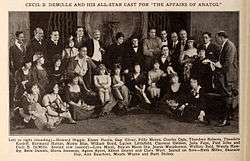Anne Bauchens
Anne Bauchens (February 2, 1882 – May 7, 1967) was an American film editor who is particularly noted for her collaboration over 40 years with the director Cecil B. DeMille.
Anne Bauchens | |
|---|---|
 Cast and crew from The Affairs of Anatol (1921), Bauchens is third from the left in the front row | |
| Born | Roseanne Bauchens February 2, 1882 St. Louis, Missouri |
| Died | May 7, 1967 (aged 85) Woodland Hills, California |
| Awards | Academy Award for Best Film Editing 1940 North West Mounted Police |
Personal life
Anne (born Roseanne Bauchens) was born in St. Louis, Missouri, to Otto Bauchens and Louella McKee. She had a brother named Harry. She never married.
Hollywood career
Bauchens was trained as an editor by DeMille,[1] and shared her first credit with him on the film Carmen. Prior to 1918, DeMille had edited, as well as directed, his films.[2] After Carmen and We Can't Have Everything (1918), Bauchens no longer shared the editing credits with DeMille. She edited DeMille's films for the rest of their long careers, through the 1956 film The Ten Commandments.
When the Academy Award for Best Film Editing was created in 1934, Bauchens received one of the three nominations for her editing of Cleopatra. She later won the Academy Award for North West Mounted Police (1940) and became the first woman to win the Oscar in that category. She was nominated for the Academy Award for Film Editing again twice, first for The Greatest Show on Earth in 1952 and then for The Ten Commandments in 1956. In total, Bauchens is credited with editing on 41 films directed by DeMille and on 20 films with other directors.[3]
Despite her long career and her series of awards, the characterizations of Bauchens as an editor are not invariably flattering. Margaret Booth, another distinguished film editor, has been quoted as saying in 1965 that "Anne Bauchens is the oldest editor in the business. She was editing for years before I came into the business. DeMille was a bad editor, I thought, and made her look like a bad editor. I think Anne really would have been a good editor, but she had to put up with him — which was something."[4]
Selected filmography
- The Ten Commandments (1956)
- The Greatest Show on Earth (1952)
- Samson and Delilah (1949)
- North West Mounted Police (1940)
- Cleopatra (1934)
- Craig's Wife (1928)
- The Ten Commandments (1923)
- Adam's Rib (1923)
- Why Change Your Wife? (1920)
References
- Higashi, Sumiko (1994). Cecil B. DeMille and American Culture: The Silent Era (University of California Press), p. 223. ISBN 0-520-08557-4.
- The original 1915 version of Carmen appears to be lost; Bauchens' credit as co-editor is for the 1918 re-release of the film. See p. 217 of the book by Sumiko Higashi.
- Totals based on Bauchens' filmography compiled at the imdb.com website; filmography retrieved 2008-06-24.
- Lewis, Kevin (2006). "The Moviola Mavens and the Moguls: Three Pioneering Women Editors Who Had the Respect of Early Hollywood's Power-Brokers", in Editors Guild Magazine, Vol 27, No. 2 (March–April 2006). Archived at WebCite from this original URL 2008-06-22.
External links
- Anne Bauchens on IMDb
- Anne Bauchens at Women Film Pioneers Project
- Anne Bauchens at Find a Grave